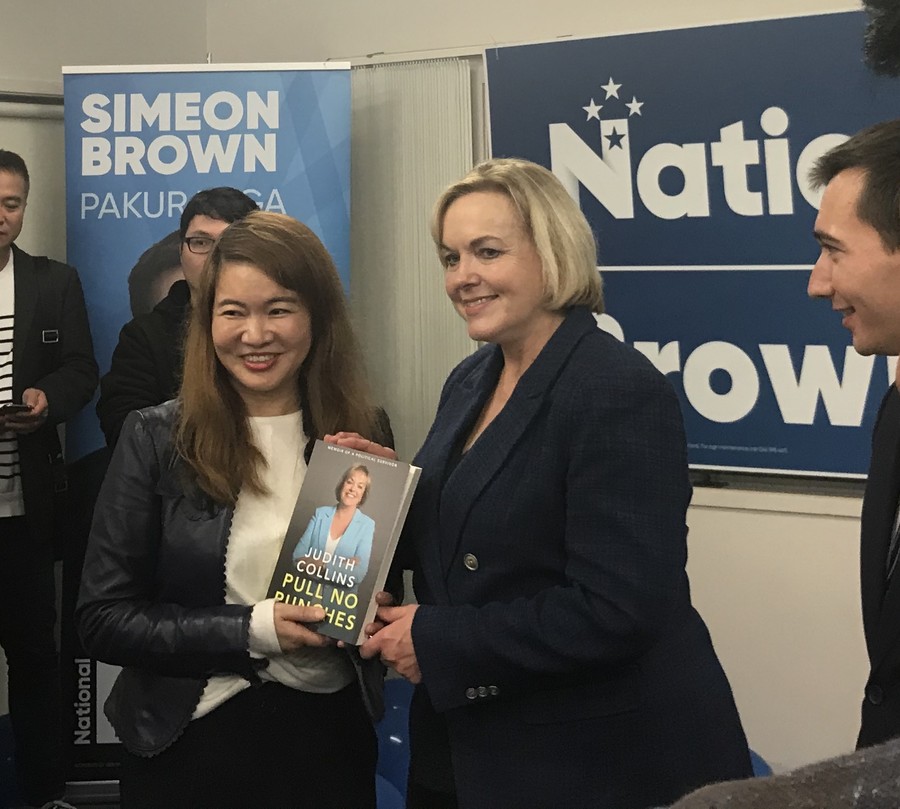Table of Contents
Portia Mao
asiamediacentre.org.nz
Portia Mao has been working as a journalist since graduating from Auckland University with a Masters degree in Film, Television and Media Studies in 2002.
Following a public appearance in Pakuranga by National Party leader Judith Collins, journalist Portia Mao went out to the New Zealand-Chinese community to see what questions and advice they had for her.
Chinese voters are interested in the new leader of the National Party: Judith Collins who at 61 is fulfilling her dream. They have advice for her, including to keep her distance from some Chinese businesspeople and they also have questions for her, like why doesn’t she use her husband’s surname? And what her attitudes are towards China and Trump?
In general, Chinese voters believe Collins is the most capable person to lead the National Party and compete against Labour in the general election. Her public speech at Pakuranga Sailing Club on July 16, the second day in her new role, attracted around 100 local supporters, including Kiwis from the Chinese and Indian communities. Her announcement to get rid of the Resource Management Act (RMA) won her a round of applause.

But, like many New Zealanders, what the Chinese community is concerned most about is the National Party’s prescription for the post-COVID-19 economic renewal.
Like usual, the Chinese people were among the most generous donors in the political campaign. The Chinese population accounts for close to a third of the population in the Pakuranga electorate but about half of the donors at the event were Chinese donors.
Collin’s new book Pull No Punches was auctioned off at $4000 and the owner of Chinese Herald, Lili Wang, was one of two successful bidders.
However, some people raised concerns that National might be too close to the Chinese government and to Chinese businesspeople. A university lecturer reminded Judith Collins of being careful when taking photos with Chinese businesspeople and to make sure the photos are not used for business purpose.
Some people were concerned over Collins’ husband’s role of director in an Auckland-based Chinese company.
It is not strange that the second generation of Chinese immigrants have different views from their parents when it comes to New Zealand politics.
A Chinese electrician said his eldest son, a tertiary school student, was not fond of Collins’s recent famous question: “Is there something wrong with me being white?”. The electrician didn’t feel it was a problem. He told his son that Asian MPs do not necessarily represent Asian’s interests better than any other MP in Parliament.
A Chinese voter also said he didn’t need a Chinese MP to represent him, instead saying Chinese people often understand English and that local Chinese media helps a lot in offering information about mainstream New Zealand society. He felt that Chinese MPs were too close with pro-China organisations (associations) inside the Chinese community.

Some Chinese voters seem to quite like Collins’ outspoken style, which reminds them of former Prime Minister Margaret Thatcher. One man said, “It is better for New Zealand to have a centre-right political party in power, as is the case in America and the UK.”
A Chinese woman, who had been a long time National Party supporter, said she might vote ACT instead in this year’s general election, while another Chinese man said he was thinking of supporting New Zealand First rather than National.
Chinese voters have lots of questions for the new leader of the National Party. They want to know whether National would find someone to replace Dr. Jian Yang, who would retire after the election, and how the party would maintain communication channels with the Chinese community without a Chinese MP.
One Chinese voter said: “The Chinese are part of New Zealand society and don’t doubt that its interests are consistent with that of New Zealand as a whole. However, the community has its own particularities as most of its people are recent immigrants with different cultural and language backgrounds and they do not have enough knowledge of local culture and politics. The first generation of Chinese immigrants is disadvantaged in job hunting and many of them have to work for Chinese bosses who exploit them. The Chinese community needs people who understand their own culture and situation to be able to communicate with various political parties and fight for the policies that the community deserves at the parliamentary level. Parliament is a place for negotiation among different social classes after all. But the question is, do the Chinese MPs perform their duties well?”
Chinese voters are interested in a National government’s stance towards China and the United States if it wins the election. Some are also interested in Collins’s opinion on Trump and on the Black Lives Matter movement. One person even wanted to know whether a National government would follow Australia and the UK in accepting Hong Kong citizens due to the new Hong Kong security law.
One Chinese woman raised a serious question to Judith Collins regarding the New Zealand Superannuation and Retirement Income (Fair Residency) Amendment Bill that passed its first reading early this month. She wanted to know what Collins’s attitudes towards the bill were. The bill would change the minimum residence period for superannuation from 10 years to 20 years, after age 20. She wished the bill would not apply to the old Chinese people who are already living in New Zealand.
Compared to the above questions, the last one for Judith Collins sounds easy but a bit tricky. “Why don’t you use your husband’s surname?“
Views and opinions expressed here are those of the individuals writing or interviewed in the article.
If you enjoyed this BFD article please share it with others.







